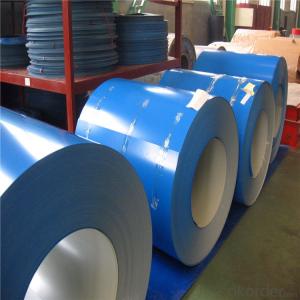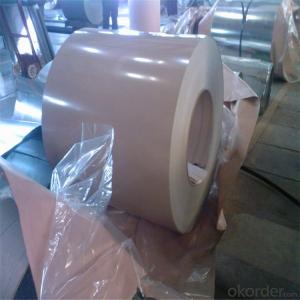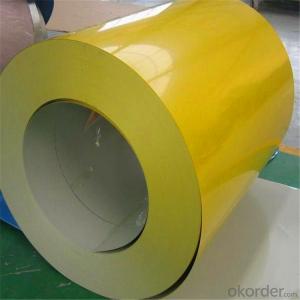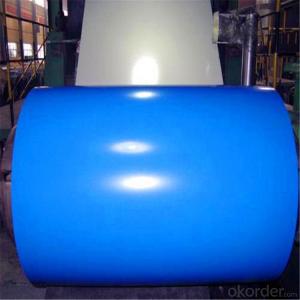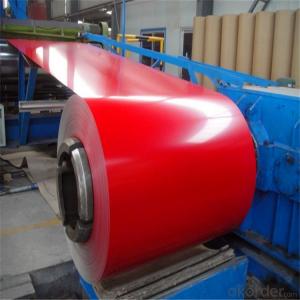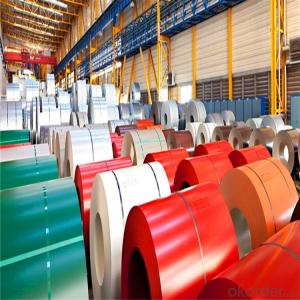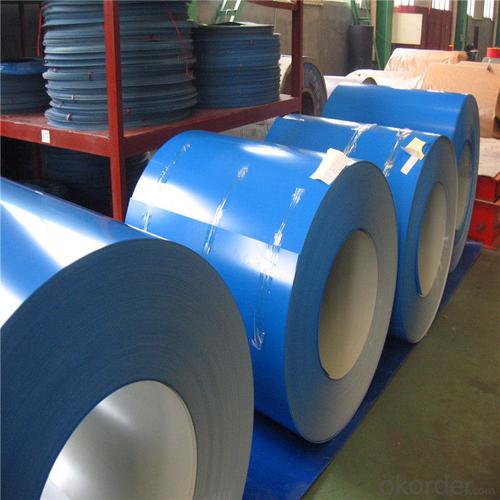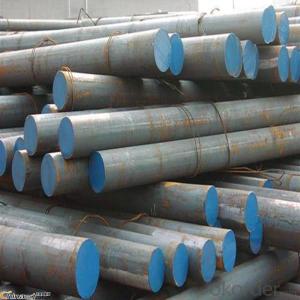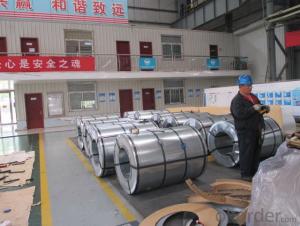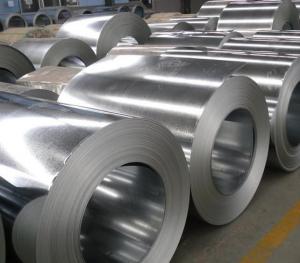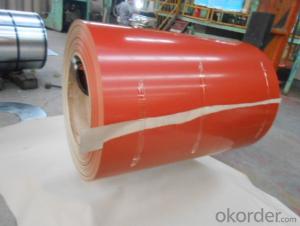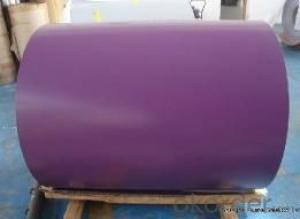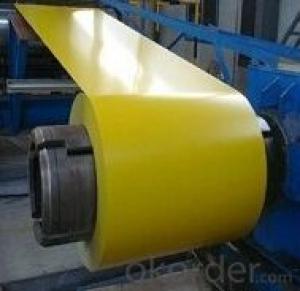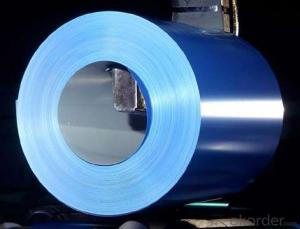High Strength Color Coated Galvanized Steel Coils SGCC PPGI
- Loading Port:
- Tianjin
- Payment Terms:
- TT OR LC
- Min Order Qty:
- 100 m.t.
- Supply Capability:
- 50000 m.t./month
OKorder Service Pledge
OKorder Financial Service
You Might Also Like
Specification
High Strength Color Coated Galvanized Steel Coils SGCC PPGI
Description of High Strength Color Coated Galvanized Steel Coils SGCC PPGI
Product | PPGI/PPGL |
Capacity | 5,000 tons/month |
Base material | Hot dipped galvanized steel |
Thickness | 0.2-2.0mm |
Width | 600-1250mm(according to your need) |
Coil Weight | 3-6tons |
Quality | SGCC, DX51D |
Color | RAL No. or customers samples’ color |
Zinc-coating | 30g/m2-180g/m2 |
Coil ID | 508mm/610mm |
Technique | Cold rolled—hot dipped galvanized—color coated |
Painting | Top painting:15~25μm |
Back painting: 6~10μm | |
Tolerance | Thickness: +/-0.02mm |
Width:+/-2mm | |
Shipment time | within 15-45 workdays |
Payment | T/T, L/C at sight |
Packing | Standard export packing |
The special order can be negotiated. | |
Application of High Strength Color Coated Galvanized Steel Coils SGCC PPGI
APPLICATION OF OUR PREPAINTED STEEL | ||||||||||
Construction | Outside | Workshop,agricultural warehouse,residential precast unit | ||||||||
corrugated roof,roller shutter door,rainwater drainage pipe,retailer booth | ||||||||||
Inside | Door,doorcase,light steel roof stucture,folding screen,elevator,stairway,ven gutter,Construction Wall | |||||||||
Electrical applicance | Refrigerator,washer,switch cabnet,instrument cabinet,air conditioning,micro-wave owen,bread maker | |||||||||
Fuiniture | Central heating slice,lampshade,chifforobe,desk,bed,locker,bookself | |||||||||
Carrying trade | Exterior decoration of auto and train,clapboard,container,isolation lairage,isolation board | |||||||||
Qthers | Writing panel,garbagecan,billboard,timekeeper,typewriter,instrument panel,weight sensor,photographic equipment | |||||||||
Products Show of High Strength Color Coated Galvanized Steel Coils SGCC PPGI

Product Advantages
1.With nearly 20 years experience in prepainted steel, accommodate different marketdemands. | ||||||||||||||
2.'Quality first, service first' is our business aim; 'The good faith get respect,cast quality market' is our Business philosophy . | ||||||||||||||
3.Having two series producttion line,with the abbual production capacity of 240000 tons. | ||||||||||||||
4.Exceed International ISO9001:2008&ISO14001:2004 quality and environmental standards | ||||||||||||||
5.Meet with ROHS standard |
Company Information
CNBM International Corporation is the most important trading platform of CNBM group.
Whith its advantages, CNBM International are mainly concentrate on Cement, Glass, Iron and Steel, Ceramics industries and devotes herself for supplying high qulity series of refractories as well as technical consultancies and logistics solutions.


F A Q
1, Your advantages?
professional products inquiry, products knowledge train (for agents), smooth goods delivery, excellent customer solution proposale
2, Test & Certificate?
SGS test is available, customer inspection before shipping is welcome, third party inspection is no problem
3, Factory or Trading Company?
CNBM is a trading company but we have so many protocol factories and CNBM works as a trading department of these factories. Also CNBM is the holding company of many factories.
4, Payment Terms?
30% TT as deposit and 70% before delivery.
Irrevocable L/C at sight.
5, Trading Terms?
EXW, FOB, CIF, FFR, CNF
6, After-sale Service?
CNBM provides the services and support you need for every step of our cooperation. We're the business partner you can trust.
For any problem, please kindly contact us at any your convenient time.
We'll reply you in our first priority within 24 hours.
- Q: How is heat-resistant steel used in the production of furnaces and boilers?
- Heat-resistant steel is used in the production of furnaces and boilers due to its ability to withstand high temperatures. It is utilized in various components such as heat exchangers, tubes, and piping systems, ensuring efficient heat transfer and preventing structural damage. This steel's resistance to oxidation and corrosion guarantees longevity and reliability, making it an essential material for manufacturing furnaces and boilers.
- Q: What are the different methods for improving the fatigue strength of special steel?
- There are several methods for improving the fatigue strength of special steel. 1. Heat treatment: One of the most common methods is through heat treatment processes such as annealing, quenching, and tempering. These processes help to refine the microstructure of the steel, reducing the presence of impurities, and improving its fatigue resistance. 2. Surface treatment: Surface treatments like shot peening and nitriding can enhance the fatigue strength of special steel. Shot peening involves bombarding the surface of the steel with tiny metal particles, inducing compression stress in the material, which helps to prevent crack initiation and propagation. Nitriding involves diffusing nitrogen into the surface layer of the steel, forming a hard and wear-resistant nitride layer that enhances the fatigue resistance. 3. Alloying: Alloying special steel with certain elements can significantly improve its fatigue strength. For example, adding chromium, molybdenum, or vanadium can enhance the steel's hardenability and resistance to fatigue. These alloying elements form carbides or nitrides, which act as barriers to crack propagation. 4. Surface coatings: Applying protective coatings like electroplating, hot-dip galvanizing, or physical vapor deposition (PVD) can help improve the fatigue strength. These coatings provide a barrier against environmental factors that may lead to corrosion or surface damage, ultimately enhancing the fatigue life of the steel. 5. Grain refinement: By refining the grain size of the steel through processes like severe plastic deformation or equal channel angular pressing (ECAP), the fatigue strength can be improved. Fine-grained steels have a higher resistance to crack initiation and propagation, resulting in enhanced fatigue properties. 6. Residual stress management: Controlling and managing residual stresses in the steel can improve its fatigue strength. Techniques like stress relieving or shot peening can help to reduce tensile residual stresses, which are detrimental to fatigue resistance. It is important to note that the selection of the most appropriate method for improving fatigue strength depends on the specific requirements, the type of special steel, and the intended application of the material.
- Q: What are the different types of special steel?
- There are several types of special steel, including stainless steel, tool steel, high-speed steel, carbon steel, alloy steel, and maraging steel. These different types of special steel are designed to possess specific properties and characteristics that make them suitable for various applications across industries such as construction, automotive, aerospace, and manufacturing.
- Q: What are the different heat-resistant grades of special steel?
- There are several heat-resistant grades of special steel, including stainless steels like 304H, 310H, and 347H, as well as nickel alloys like Inconel 600, Inconel 625, and Hastelloy C276. These grades are specifically designed to withstand high temperatures and maintain their strength and corrosion resistance even in extreme heat environments.
- Q: How does special steel contribute to the energy equipment industry?
- Special steel plays a crucial role in the energy equipment industry by providing the necessary strength, durability, and resistance to extreme conditions. The energy equipment industry encompasses various sectors such as oil and gas, renewable energy, power generation, and transmission, all of which rely heavily on special steel for their infrastructure and machinery. In the oil and gas sector, special steel is used in the construction of pipelines, drilling equipment, and storage tanks. The unique properties of special steel, such as high tensile strength, corrosion resistance, and the ability to withstand high pressure and temperature, make it an ideal material for these applications. Special steel also ensures the safety and reliability of oil and gas operations, as it can withstand harsh environments, including corrosive substances and extreme weather conditions. In the renewable energy sector, special steel is used in the manufacturing of wind turbines, solar panels, and hydroelectric power systems. These energy sources require strong and lightweight materials that can withstand constant exposure to nature's elements. Special steel alloys, such as high-strength low-alloy (HSLA) steel and stainless steel, are commonly used to construct the infrastructure of renewable energy systems, ensuring their longevity and efficiency. Furthermore, special steel is essential in power generation and transmission equipment. It is utilized in the manufacturing of gas turbines, steam turbines, and generators. Special steel alloys can endure the high temperatures and pressures generated during power generation processes, ensuring the efficiency and reliability of energy production. Additionally, special steel is used in the transmission infrastructure, including transmission towers and power cables, to support the efficient and safe transfer of electricity over long distances. Overall, special steel contributes significantly to the energy equipment industry by providing the necessary strength, durability, and resistance to extreme conditions. It enables the construction of reliable and efficient infrastructure, ensuring the smooth operation of energy systems, whether in oil and gas, renewable energy, or power generation and transmission.
- Q: What are the challenges in heat treatment of special steel alloys?
- The heat treatment of special steel alloys presents various difficulties due to their unique composition and properties. One of the primary obstacles is attaining the desired microstructure and mechanical properties while maintaining dimensional stability. Special steel alloys often contain intricate alloying elements and necessitate specific heat treatment processes to achieve the desired properties. Another hurdle involves controlling the rates of heating and cooling throughout the heat treatment procedure. Special steel alloys are often sensitive to rapid or uneven temperature changes, which can lead to distortion, cracking, or the formation of undesirable phases. Hence, ensuring precise control of the heating and cooling rates is crucial to avoid these issues and ensure uniformity in the final product. Furthermore, the presence of alloying elements in special steel alloys can increase their hardenability, making it challenging to achieve the desired hardness consistently across the entire component. Adequate attention must be given to selecting appropriate heat treatment parameters, including temperatures, soaking times, and quenching media, in order to achieve the desired hardness and prevent excessive hardness gradients. Additionally, special steel alloys are prone to oxidation and decarburization during heat treatment due to their high alloy content and exposure to elevated temperatures. These reactions can result in surface defects and a decrease in carbon content, thereby impacting the final properties of the alloy. Consequently, careful control of protective atmospheres or heat treatment environments is necessary to prevent such issues. Moreover, the size and shape of components made from special steel alloys can pose challenges during heat treatment. Large or intricately shaped components require careful consideration of heating and cooling methods to ensure uniformity in microstructure and properties throughout the entire component. This may involve the use of specialized furnaces, fixtures, or heat treatment cycles to overcome these challenges. In conclusion, the challenges involved in heat treating special steel alloys encompass achieving the desired microstructure and mechanical properties, controlling heating and cooling rates, managing hardenability, preventing oxidation and decarburization, and addressing the size and shape of components. Overcoming these challenges demands a comprehensive understanding of the alloy's composition, properties, and the application of appropriate heat treatment techniques.
- Q: What are the advantages of using special steel in specific applications?
- Using special steel in specific applications brings several advantages. Firstly, special steel outperforms regular steel in terms of strength and durability. It possesses higher tensile strength and better resistance to wear and tear, making it ideal for demanding industries like construction, automotive, and aerospace. This ensures that components made from special steel can withstand heavy loads, extreme temperatures, and harsh operating conditions without any deformation or failure. Secondly, special steel demonstrates exceptional corrosion resistance. It can effectively combat the detrimental effects of moisture, chemicals, and other corrosive elements, making it suitable for marine environments, chemical processing plants, and offshore structures. Special steel maintains its structural stability and integrity even when exposed to aggressive substances, which ultimately prolongs the lifespan of equipment and reduces maintenance costs. Another advantage of special steel lies in its versatility. It can be easily customized and tailored to meet the specific requirements of various applications. Special steel can be engineered to possess specific mechanical properties, such as hardness, toughness, or flexibility, depending on the desired application. This enables greater adaptability and empowers designers and engineers to create components that are optimized for their intended use. Furthermore, special steel often exhibits excellent heat resistance capabilities. It can endure high temperatures without sacrificing its mechanical properties, making it suitable for applications involving extreme heat, such as industrial furnaces, turbines, and engines. The steel's ability to withstand heat ensures that it retains its strength and shape, minimizing the risk of deformation or failure under elevated temperatures. Lastly, special steel offers superior machinability and weldability. It can be easily shaped, cut, and welded into intricate shapes and structures, facilitating efficient manufacturing processes and reducing production costs. Special steel's machinability also guarantees precise and accurate fabrication, resulting in high-quality components that meet stringent industry standards. In conclusion, special steel provides enhanced strength, durability, corrosion resistance, versatility, heat resistance, and excellent machinability, making it the preferred choice for various industries where reliability, performance, and longevity are crucial.
- Q: How is die steel used in metal stamping processes?
- Die steel is used in metal stamping processes as it is a strong and durable material that can withstand the high pressures and forces involved in shaping and forming metal. It is used to create dies, which are specialized tools that are used to shape and cut metal into specific designs or forms. The die steel acts as a mold or template, allowing the metal to be stamped, bent, or cut into the desired shape with precision and accuracy.
- Q: What are the properties of electrical steel?
- Electrical steel, also known as silicon steel, possesses several important properties that make it suitable for various electrical applications. It has a high magnetic permeability, which means it can efficiently conduct magnetic flux, making it ideal for use in transformers, motors, and generators. Additionally, electrical steel exhibits low core losses, reducing energy dissipation during operation. Its high electrical resistivity minimizes eddy currents, further improving efficiency. Furthermore, electrical steel has a laminated structure, reducing hysteresis losses and preventing magnetic domains from aligning, which helps in maintaining a stable magnetic field. Overall, electrical steel's properties make it a crucial material for efficient and reliable electrical devices.
- Q: How does tungsten contribute to the properties of special steel?
- Special steel greatly benefits from the inclusion of tungsten, which is a critical element that significantly impacts its properties. One of the key advantages of incorporating tungsten into steel lies in its ability to enhance strength and hardness. This is achieved through the formation of a solid solution with iron, resulting in a microstructure with fine grains that effectively increase overall toughness and wear resistance. Furthermore, tungsten plays a pivotal role in improving the high-temperature strength of special steel. Due to its high melting point, tungsten maintains its strength even under elevated temperatures, making it an ideal choice for applications that require resistance to heat and thermal stress. Consequently, special steel containing tungsten can be employed in environments with extreme temperatures, such as gas turbines, rocket nozzles, and cutting tools. Another crucial contribution of tungsten lies in enhancing the corrosion resistance of special steel. By forming stable carbides, tungsten provides a protective barrier against corrosion and erosion, effectively enhancing the durability and longevity of the steel. This is particularly invaluable in industries where the steel is exposed to corrosive environments, such as chemical processing, marine applications, and oil and gas exploration. Moreover, tungsten significantly aids in the machinability of special steel. It assists in reducing the occurrence of built-up edges during cutting operations, resulting in improved surface finish and prolonged tool life. This characteristic proves highly advantageous in industries that require precision machining, such as automotive, aerospace, and tool manufacturing. In conclusion, the presence of tungsten in special steel is of utmost importance as it enhances strength, hardness, high-temperature performance, corrosion resistance, and machinability. Its unique properties make it an indispensable component in the production of high-quality steel utilized across various industries.
Send your message to us
High Strength Color Coated Galvanized Steel Coils SGCC PPGI
- Loading Port:
- Tianjin
- Payment Terms:
- TT OR LC
- Min Order Qty:
- 100 m.t.
- Supply Capability:
- 50000 m.t./month
OKorder Service Pledge
OKorder Financial Service
Similar products
Hot products
Hot Searches
Related keywords
